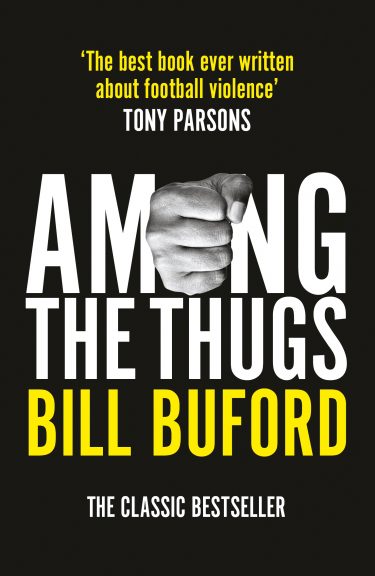Book review: Among The Thugs is hilarious at first, but ends tragically in crowd violence
 Sometimes I read something by someone that’s so brilliantly written, it makes me doubt my status as a professional writer. Bill Buford is one of those writers.
Sometimes I read something by someone that’s so brilliantly written, it makes me doubt my status as a professional writer. Bill Buford is one of those writers.
For years I’ve wanted to read his first book, Among The Thugs, published in 1990 about violent English soccer fans, but it was out of print or not in ebook form until I last checked this month. After securing a copy, I devoured the book in two days.
One critic describes it as “A grotesque, horrifying, repellant, and gorgeous book; A Clockwork Orange come to life.” I enthusiastically agree.
During the early chapters, I laughed out loud twice. By the middle chapters, I felt complicit if not guilty for reading such eyewitness horrors. I admired Buford’s honesty and vulnerability, both as a writer and journalist. As the New York Times noted in its review of the book, “Buford pushes the possibilities of participatory journalism to a disturbing degree.”
That’s because each of us become who we associate with. And after studying and associating with weekend thugs for eight years, Buford admittedly got close to becoming one. In that way, Among The thugs is an uncomfortable but important work on group think, violence as a symptom, and what can happen in overly proper societies when the root cause of problems are rarely addressed.
Five stars out of five, although it dashed my spirits for a couple of afternoons. These were my favorite passages:
- I introduced myself. I was writing about football supporters. Did he mind if I asked him some questions? He stared at me. Then he said, “All Americans are wankers.” And paused. “All journalists,” he added, showing, perhaps, that his mind did not work along strictly nationalist lines, “are cunts.” We had established a rapport.
- Mick paused, started to utter something, and then belched. It was a spectacular belch, long and terrible, a brutal, slow bursting of innumerable noxious gastric bubbles. It was a belch that invited speculation: about the beverages, the foods, and the possible quantities that had contributed to a spray so powerful that it seemed to rise endlessly from deep within Mick’s tortured torso.
- It was a strange thought: here was someone who believed that, at this precise moment, following a street scuffle, he had succeeded in capturing one of life’s most elusive qualities (happiness). But then he, dazed, babbling away about his happiness, disappeared into the crowd and the darkness.
- “We look forward to Saturdays,” he said, “all week long. It’s the most meaningful thing in our lives. It’s a religion, really. That’s how important it is to us. Saturday is our day of worship.”
- “The violence,” he said. “We’ve all got it in us. It just needs a cause. It needs an acceptable way of coming out. And it doesn’t matter what it is. But something. It’s almost an excuse. But it’s got to come out. Everyone’s got it in them.”
- I was curious. I had a chance to meet the devil, and I wanted to find out if he deserved his bad reputation.
- The fact was I hadn’t expected to hear racism expressed so explicitly by people I had only just met, regardless of where they worked. I felt soiled by it, implicated because I couldn’t imagine these things being said unless it was assumed that all of us, the bar staff and the National Front and I, thought the same. The barmaid was attractive—she had black hair and a soft oval face—and it was disconcerting trying to reconcile this face with the ugliness that came out of it.
- I have gone too far, I remember thinking. I have let myself become one of them. Here I am, being whipped by a policeman, arguing with him, being urged on by the supporters behind me—by the supporters behind me? By the one thousand supporters behind me: here I am at the front of a crowd, among the people leading it.
- I wasn’t interested in questions of right or wrong, and I didn’t ask them. I wanted to get close to the violence—very close, as close as I could possibly get—because I thought that this way I would find out how it worked.
- This is, if you like, the answer to the hundred-dollar question: why do young males riot every Saturday? They do it for the same reason that another generation drank too much, or smoked dope, or took hallucinogenic drugs, or behaved badly or rebelliously. Violence is their antisocial kick, their mind-altering experience, an adrenaline-induced euphoria that might be all the more powerful because it is generated by the body itself, with, I was convinced, many of the same addictive qualities that characterize synthetically produced drugs.
- This bored, empty, decadent generation consists of nothing more than what it appears to be. It is a lad culture without mystery, so deadened that it uses violence to wake itself up. It pricks itself so that it has feeling, burns its flesh so that it has smell.
